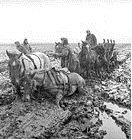Rasputitsa
Posts: 2903
Joined: 6/30/2001
From: Bedfordshire UK
Status: offline

|
quote:
ORIGINAL: LiquidSky
There seems to be two types of gamers. The Book Readers, and the Armchair Generals.
The Book Readers try to find some similarity from what they have read in history to what is occuring in a game. They use this knowledge as a benchmark for victory. As well, they are comforted by the power of hindsight. They would rather manipulate the framework, then the pieces. When Victory finally comes, he is satisfied because he got to emulate <insert famous general here>.
The Armchair General looks at a game as its own world. Whatever he can do within the engine to defeat his enemy is fair game. He expects no less from his opponent. When Victory finally comes, he is satisfied because it came from his own ingenuity, rather then following somebody elses blueprint.
Realistic mechanisms should provide a good framework for a game. Throwing in effects as events is good when they are unknown. They provide a reason for strategy, and will favour the player who can adapt. Personally I like the idea of designing not based so much on reality, but on perceptions. For example..the Germans were deathly afraid of the French attacking them early. So make the French units powerful in 1939, but fix them so they cant move into Germany. Then in some random spring turn, remove their power boost.
This would be designing for effect.
In Great Struggles for Europe, a WWI simulation, they have a rule that if you are out of supply, you are eliminated. While it may seem strange that large forces would evaporate because you got behind them and took a supply source (a city), but the effect really was that players were very concerned about their flanks. A silly unrealistic rule.....has a realistic effect.
Another one is having sudden death victory cities. If taking Moscow in WiTE by summer 1942 caused an axis victory, you could sure bet the Russian player will defend it heavily. Maybe so heavily that Case Blue becomes a possibility. That is design for effect. It is silly to think the russians would surrender if Moscow was to fall..yet they did defend it heavily, and some German generals were insistant that they had to take it.
I am a strong believer in design for effect. But it sure upsets the Book Readers.
'Unity of Command' seems to be a game with a loose connection with the historical events and to be successful you need to know the game, more than the history, there are limited ways to win and you need to solve the puzzle. The other option is a game where if you understand the historical events you should have a reasonable chance of playing the game well. All games have rules and you need to know these, to make the game work, but war is not absolute and in reality a lot of it was intuition.
I don't get a lot of pleasure from number crunching and detailed odds analysis, so I guess that may make me a 'book reader' and I would not want a game that can be solved, because with that solution cracked, the game is dead.
The first game of ToF I played was 'Fall Gelb' as Axis v AI, the Soviets attacked in turn 4, impossible, not historical, would never have happened, maybe, but it led to a great game.
I think the game should have the historical capabilities of each side's WW2 forces and there is a framework of politics (US unlikely to join Axis, etc.), weather (bad things happen in winter) and geography (supply), but after that let the game go where it will.
As a potential 'book reader' I would like to see realistic cause and effect, running in line with actual WW2 capabilities, but I wouldn't say 'this is the historical timeline I have read about and this should happen in my game', it's more that this is how forces performed and how could I do better, or worse which is just as likely.
One effect we all have is hindsight, we know the plot, where things worked and where they didn't, what to guard against, etc.. The game needs to have the uncertainty that existed during the actual events, before the books were written and I think in large measure it does that. 
_____________________________
"In politics stupidity is not a handicap" - Napoleon
“A people which is able to say everything becomes able to do everything” - Napoleon
“Among those who dislike oppression are many who like to oppress" - Napoleon
|
 Printable Version
Printable Version







 ) that realistic effects may be easier to achieve ... so that may be the best way to go if that's the case.
) that realistic effects may be easier to achieve ... so that may be the best way to go if that's the case. 






 New Messages
New Messages No New Messages
No New Messages Hot Topic w/ New Messages
Hot Topic w/ New Messages Hot Topic w/o New Messages
Hot Topic w/o New Messages Locked w/ New Messages
Locked w/ New Messages Locked w/o New Messages
Locked w/o New Messages Post New Thread
Post New Thread